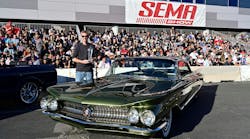Last year, Bonnie Greenwood, a former student at WyoTech in Laramie, Wyo., and currently a diesel technician at FedEx Freight, became the first woman to win the Technology & Maintenance Council’s TMC FutureTech National Student Technician Competition.
The competition was held in September by the TMC and ATA. The annual event includes a competition for professional technicians (SuperTech) and students (FutureTech).
Greenwood’s grand champion victory wasn’t just significant in the history of the competition; it is also an indicator of the larger role women are going to play in the industry moving forward.
With technicians in short supply around the U.S., companies in the autobody and mechanical repair industries have gone to great lengths to attract, train, and retain new techs. There has also been a concerted effort to recruit more women into the field.
“Women are capable of anything, especially when we set our minds to it,” Greenwood says. “People keep asking me why I chose to enter a male-dominated industry. And to be honest, that fact wasn’t even on my radar. I wanted to enter an industry in which I saw opportunity, variety, stability and satisfaction. I am proud of who I am and if winning TMC FutureTech helps this industry to further accept women amongst its ranks, then I am also proud to represent this cause.”
“We have a massive technician shortage, and we’re not going to solve it by leaving 50 percent of the workforce off the radar screen,” says Jennifer Maher, CEO and executive director of the TechForce Foundation, which co-sponsored the competition. TechForce encourages student participation in the automotive repair trades through scholarships, grants, and career development. “Having women represented in the industry and having variety of diversity in the workforce is beneficial to companies. You think differently, and you get different points of view and different ways to solve problems.”
Winding career path
Like many women, Greenwood had not received any previous encouragement to participate in the trades, and her path into the automotive repair industry was a long and circuitous one, to say the least. The Georgia native had enough Advanced Placement credits to start college as a sophomore in 2006, and earned a bachelor’s in wildlife biology. After college, she worked as a math tutor, a substitute teacher, and a bartender before working her way up to management positions in the hotel restaurant and banquet services sector.
She then went to work with the U.S. Forest Service in Alaska before landing in Wyoming and working in the banking industry. “I eventually found myself sitting at a desk behind a computer and realized that was not what I wanted to do for the rest of my life,” Greenwood says. “I talked with family and friends and figured out what I liked about each job I'd had in the past and what my strengths are and led myself to WyoTech [Laramie].”
Greenwood liked working with her hands and opted to pursue the diesel technician program. The coordinator of the diesel program asked Greenwood and two other students to represent the school at the FutureTech competition. She was sponsored by FedEx Freight (the company hired Greenwood after she completed the WyoTech program).
Greenwood won both the electrical diagrams and torque stations of the competition, in addition to being named the overall winner.
While diesel repair was a completely new area for Greenwood when she entered WyoTech, she says she grew up building models with her father and doing basic maintenance at home. She also refurbished bicycles, did woodworking, and took care of maintenance on her own vehicle.
“I have a DIY attitude and enjoy hands-on work,” Greenwood says. “While performing wildlife biology field research and working for the USFS in Alaska, I learned to solve problems with limited resources. Working at banquets in hotels required me to fix broken tables or malfunctioning A/V equipment on the fly. I enjoy learning how mechanical systems work and have always been fascinated by physics.”
Greenwood was one of just a handful of women in the program at WyoTech and says the admissions representative would often use those students as examples to show other prospective students that the trades were an option.
“Girls are often raised to believe that they cannot and should not become a mechanic or welder or electrician,” Greenwood says. “While attending WyoTech, my admissions representative came to me several times to describe phone calls she had with prospective female students and their parents. Too often, the parents would insist that their daughter did not belong in the automotive or diesel industry and that she would not be successful in such a career. And sadly, sometimes the girls would have a similar view. We need to empower girls and let them know the true plethora of options they have before them."
“Bonnie’s story is rather unique,” says Greg Settle, director of national initiatives at the TechForce Foundation. “She’s got a bachelor’s degree, and she’s had opportunities in a number of different fields. She thoughtfully looked and evaluated different industries, and after all that experience she has come to the decision that this is the right industry for her. And not just because she enjoys the work; she also sees future potential in it.”
New approaches to recruitment
The TechForce Foundation sees events like FutureTech as an important way to help highlight the industry and attract new technicians. “We can talk all day long about opportunities in the profession, but when young people get their hands on the tools and are competing and building those skills, they can really find themselves in that zone. They realize they are a hands-on learner, they are good at this, and they love the problem solving and diagnostics involved.”
Greenwood says that more emphasis should be placed on defining these jobs as STEM (science, technology, engineering, mathematics) careers.
“We can’t succeed by just turning wrenches and swapping parts,” Greenwood says. “We are diagnosticians and problem solvers. Society tends to look down upon young adults pursuing a trade instead of a college degree. I hope that that perception continues to change. Just because a high school student is great at math and science does not mean they need to pursue a college degree in engineering or architecture. Maybe becoming a diesel technician would lead to a successful and satisfying career for them and provide a valuable asset to this industry.”

